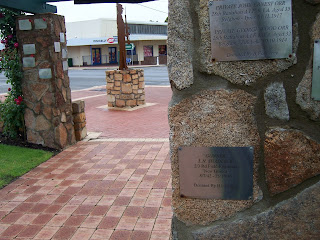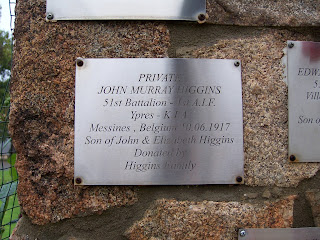



The stage coach carried mail between Albany and Perth. The vehicles were drawn by four horses that stopped every 30 miles to rest, drink water and feed. An armed policeman sat next to the driver, which still allowed room for another 2 seated passengers at the front. The mail was carried inside the coach and Stage Coach West was fined if they missed a journey. There was room for additional passengers if they were prepared to lie on the roof of the coach with their feet hanging off the back. John and Henry Chipper ran the mail run. I can't find a lot of information but the horses travelled at 6 miles an hour to complete the very long journey on schedule. I discovered that John's father was given a death certificate which stated that John Chipper (mail coach driver and storekeeper, according to the record) died at the age of 36 so he appears to have died reasonably young. The Stage Coast West building was rescued by the Pingelly shire and is named with their list of heritage buildings, some with wonderful Circa and structural details from the early 1900s. The former Commercial Bank building, built in 1911, stands where the blacksmith's shop used to be. An old 'Western Mail' (February 1939) said that the Narrogin Inn, at the intersection of the Albany and Bunbury Roads, was a stage coach stopping place and an important landmark on the fifty hour journey. The Albany road was not heavily used at the time and was West Australia's most important road. It was built entirely by cheap convict labour. In the mid-1880's, the horse-drawn mail coach travelled 420km each way, fortnightly. In winter, when the road was wet and boggy, the passengers and the policeman had to disembark and help push the carriage out of the mud.
Many of the early families had moved here after prospecting in the goldfields. Men had walked through a harsh landscape and desert to get to places like Coolgardie and Broad Arrow, pushing their possessions in wheelbarrows from Perth to go prospecting and live in tents, sometimes for a few years. The thing that has struck me the most was that when a prospector was downed with an illness like typhoid, his mine or excavation was marked and no-one dared touch it. The other men would sometimes care for them and feed them their best morsels of food until they got well or died. If the man died, the man that cared for him was given his 'claim' to keep. It was an honour system that no decent fellow would disregard. Thieves were threatened with having their ears clipped with a knife if they didn't leave town, hence the term, "I'll clip your ears" that we use today was probably derivative. It wasn't uncommon for men to be run out of town. Dysentry and typhoid killed many hopeful men. Men and horses perished in the desert from dehydration. The smarter ones used camels. Food would run out in the camps for days because of diificult conditions getting supplies to the goldfields. Kalgoorlie has records of terrible fires that burned for weeks when there was no water so water, still today, is something precious and not taken for granted. For a baker, usually the first businesses that set up in mining camps, water was worth far more than the gold they were standing on.
.











































































